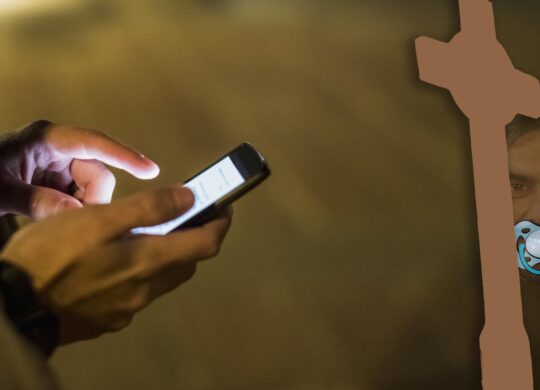Pacifier!

Shiri Melumad is Assistant Professor of Marketing at the Wharton School of the University of Pennsylvania. This researcher has done a lot of work on smartphones and our relationship with that ubiquitous, ever-present device.
Said Melumad, of her own experience:
Just holding it made me feel good. It gave me a sense of ease or calm. It was similar to children who seek out their pacifiers when they are stressed. For many of us, our phone represents an attachment object, much as a security blanket or teddy bear does for a child. Once after I accidentally left my phone in a restaurant. I definitely freaked out—I haven’t lost it since.”
Melamud recently published a study with a co-author: “The Smartphone as a Pacifying Technology,” in Journal of Consumer Research.
Their conclusion:
We propose that in addition to obvious functional benefits, consumers in fact derive emotional benefits from their smartphone—in particular, feelings of psychological comfort and, if needed, actual stress relief. In other words, in a sense, smartphones are not unlike adult pacifiers. This psychological comfort arises from a unique combination of properties: the portability of the device, its personal nature, the subjective sense of privacy experienced while on the device, and the haptic gratification it affords.”
Eighty-one percent of adult Americans own such a device. One-third of all consumer purchases—over $1 trillion—occur on mobile platforms. Virtually everywhere, whether on public transit, at dinner, in bed, or even while crossing the street, consumers are engrossed in their devices, calling, texting, listening, watching, …. Indeed, one-half of owners describe their device as something that they “could not live without.”
Wow! That’s something! It is as if their owners have a deep personal connection with their phones. It is part of them. It is them! (Or “they” if you want to be grammatically correct.)
In fact, this is true only of phones, not laptops or even tablets. Perhaps because they are portable and they have haptic properties that stimulate our sense of touch. And owners tend to regard them as much more personal than computers, which are closely associated with work.
Kostadin Kushlev, assistant professor of psychology at Georgetown University, says he can see how smartphones can become pacifiers for grown-ups.
It’s a reminder that we have friends, and knowing we can reach them, even remotely, is comforting. Also, they are very personal devices, more so than any other device, and with us all the time. From that perspective, we see them as an extension of ourselves.”
Plus, they are storehouses (or connections to cloud storehouses) of all the details of our lives—banking, entertainment, where our kids are, how to get from point A to point B, not to mention all the pictures we’ve taken of every inane thing, every irrelevant scene, and every restaurant dish we’ve encountered. Your world in the palm of your hand. What control! What peace!
Adds Melumad:
The device may compensate for the stress relief previously afforded by other means, such as cigarettes. As such, health professionals might actually encourage the use of smartphones as a means to reduce stress across a variety of contexts.”
Right, so now I need to write a prescription for an iPhone-produced-peace?
Really, there is only one source of Peace in the world—Jesus Christ, who said:
“Peace I leave with you; My peace I give to you;
not as the world gives do I give to you.
Do not let your heart be troubled, nor let it be fearful.”
John 14:27
Not peace from a phone, but from the Prince of Peace!
SOURCE:
MSN.com; Journal of Consumer Research











 Abe Kuruvilla is the Carl E. Bates Professor of Christian Preaching at The Southern Baptist Theological Seminary (Louisville, KY), and a dermatologist in private practice. His passion is to explore, explain, and exemplify preaching.
Abe Kuruvilla is the Carl E. Bates Professor of Christian Preaching at The Southern Baptist Theological Seminary (Louisville, KY), and a dermatologist in private practice. His passion is to explore, explain, and exemplify preaching.